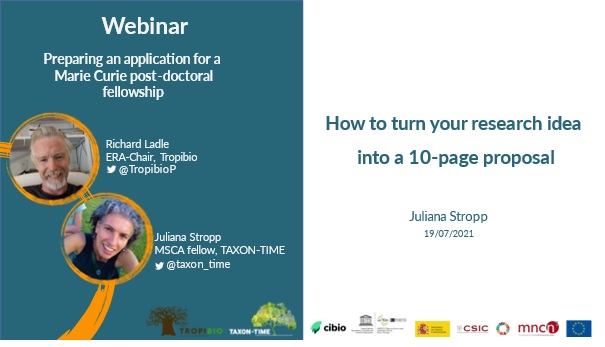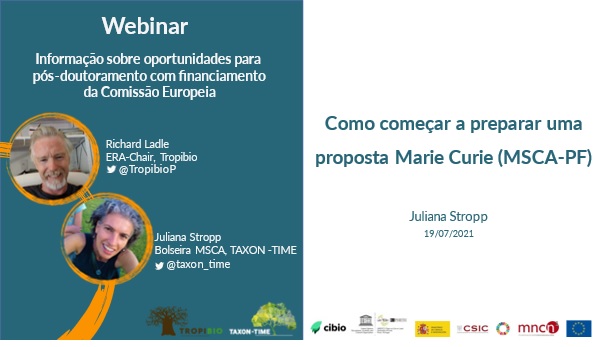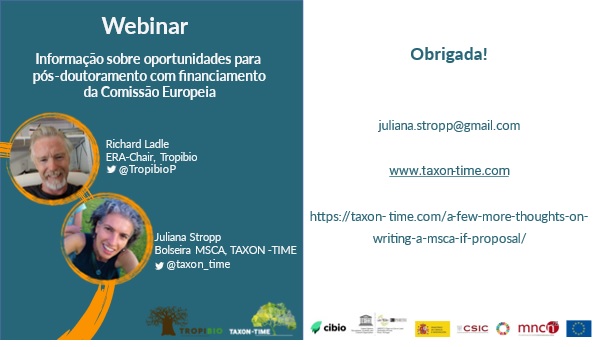First round of Webinars Marie Curie delivered
News

Initial slide from Juliana Stropp for the Webinar in English.

Initial slide from Juliana Stropp for the Webinar in Portuguese.

Final slide from Juliana Stropp for the Webinar in Portuguese.
First Marie Curie Post-doctoral fellowship training Webinars delivered in July 2021 as part of the TROPIBIO EU-Africa Cooperation Series - Marie Curie fellowships.
This Webinar series is organized and presented by the TROPIBIO ERA Chair holder – Professor Richard Ladle/TROPIBIO team together with Dr Juliana Stropp, an MSCA Fellow at Museo Nacional de Ciencias Naturales (MNCN-CSIC) in Madrid. Professor Ladle has previously worked as an expert evaluator for the MSCA Postdoctoral Fellowships and Dr Stropp ran a very successful Webinar in Brazil in 2020 on applying for the MSCA Fellowships and the current webinars are an adaptation of this model. The Webinars are given during to separate sessions, one in English and one in Portuguese.
The first two sessions of the TROPIBIO Webinar and training in this series was given on the 19th of July 2021, with the main objective to assist early career researchers in Africa, as well as CIBIO-BIOPOLIS researchers, to apply for post-doctoral opportunities in Europe (e.g., the MSCA Postdoctoral Fellowships).
Two linked sessions/webinars were organized:
1. A Webinar in Portuguese aimed at researchers and students from Lusophone Africa. This webinar began with an introduction to CIBIO’s TROPIBIO project and outline different ways that African Lusophone researchers can collaborate or contribute. This was followed by an overview of the MSCA fellowships and outline the key steps in preparing a proposal.
Please download here the slides for this presentation.
the slides for this presentation.
Please download here
2. A Webinar in English aimed at African researchers from the rest of the continent. The Webinar focused on preparing and improving MSCA applications to ensure the maximum probability of success. Please download here the slides for this presentation.
The seminars were attended by 76 participants from different nationalities: Angolans, Cape Verdeans, Brazilians, Cameroonian, Portuguese, British, Botswana, Namibians, Indonesian, Nigerian, Italian, and Spanish. They were also residents from the following countries Brazil, Portugal, Angola, United Kingdom, Botswana, Germany, Spain, Namibia, France, Italy, South Africa and Cape Verde.
Various institutions from Africa were represented: Universidade Técnica do Atlântico, Mindelo - Cabo Verde; Instituto Superior Politécnico da Hul-la, Universidade Mandume Ya Ndemufayo; Okavango Research Institute, University of Botswana; University of Namibia, University of Cape Town, South Africa, Universidade 11 de Novembro, Cabinda, Angola and various Institutions from Europe/UK (eg. HU Berlin, Germany, University of Kent, University of East Anglia, Museo Nacional de Ciencias Naturales, CIBIO-InBIO-UP) and also from Brazil (Federal University of Paraiba, Federal University of Campina Grande, Federal University of Pernambuco, UNINASSAU among other institutions in Brazil).
The webinar was a great opportunity to prepare for Marie Curie Actions fellowship and also to open up for new collaborations for TROPIBIO. A year later we received an email from a participant telling us that he was awarded a Marie Curie fellowship and thanks the speakers for all the suggestions and tips.

Initial slide from Juliana Stropp for the Webinar in English.

Initial slide from Juliana Stropp for the Webinar in Portuguese.

Final slide from Juliana Stropp for the Webinar in Portuguese.